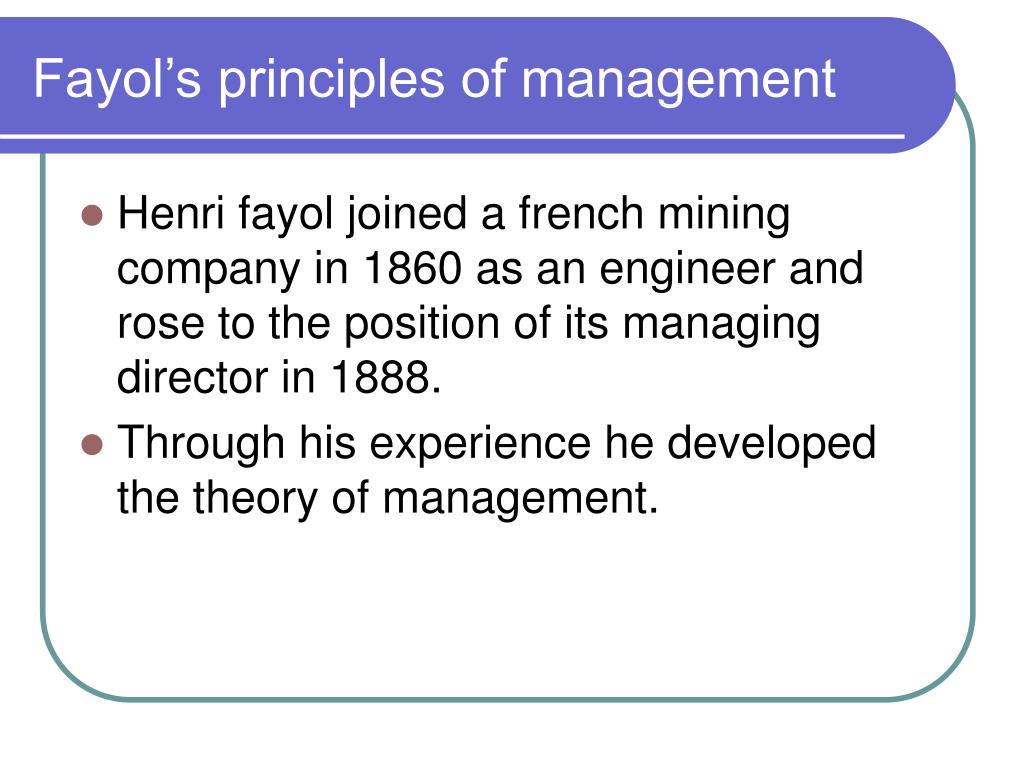


“Management…is neither an exclusive privilege nor a particular responsibility of the head or senior members of the business it is an activity spread, like all other activities, between head and members of the body corporate.”.Managerial, including planning, organizing, command, coordination, and control.“An efficient accounting system, clear and simple, giving an accurate idea of the firm’s condition, is a powerful managerial instrument ” and.Accounting, stocktaking, the balance sheet, costs, and statistics.Security, involving the protection of people and property.Since “many potentially prosperous enterprises die suffering from lack of money…nor is any reform or improvement possible without finances or credit,” optimal use of finances is critical to a business.Financial, involving the search for and optimum use of capital.Being skilled in commercial aspects is important because it has a strong impact on revenue and cost savings.


The Management Theory of Henri Fayol includes three main theories: He began garnering attention after publishing his theories in a 1908 paper, and his work culminated in the world-famous book, “Administration Industrielle et Générale” (“General and Industrial Management”).Īs a result of this piece of work, Fayol became known for his Administrative Theory, also known as “Fayolism,” and as the father of Modern Management.įayol completed his most famous works during the Classical Period of management theory, alongside contemporaries like Max Weber (known for his principles of bureaucracy) and Frederick Taylor (known for his principles of Scientific Management). By 1900, under Fayol’s management, the firm became “one of the largest producers of iron and steel in France and regarded as a vital national industry.” 3 Over the span of his career, Fayol became interested in the problems of management-at the organizational level in particular-and sought to establish general management principles that could be applied to all organizations. After graduating from mining academy L’École Nationale Supérieure des Mines, he worked as a mining engineer for Boigues Rambourg, eventually becoming Managing Director in 1888 and saving the company from bankruptcy. Jules Henri Fayol (1841-1925) was born in Galata, Ottoman Empire, and raised in France. How industrial principles developed by Fayol apply to organizations today.An overview of key Henri Fayol management theories.A description of Henri Fayol's origin and historical context.It’s associated with an “industrial” approach to business 2, including cog-like repleaceable workers and a rigid hierarchy with strong top-level command. His ideas were developed independently of other popular management theories of the time, such as Human Relations or Elton Mayo’s scientific management theories - although they drew similar conclusions about the importance of worker wellbeing to productivity.įayol’s school of thought had a stronger emphasis on the role of management in an organization, when compared with its contemporaries in the field of organizational psychology. His management theories, mostly developed and published in the early 1900s, were a major influence on the development of industrial management practice throughout the twentieth century. Henri Fayol is widely regarded as the father of modern management. These five functions comprise “management”, one of the six industrial activities described in Henri Fayol management theory. The five functions of management as defined by Henri Fayol are: Planning, Organizing, Command, Coordination, and Control. What are Henri Fayol’s five functions of management?


 0 kommentar(er)
0 kommentar(er)
